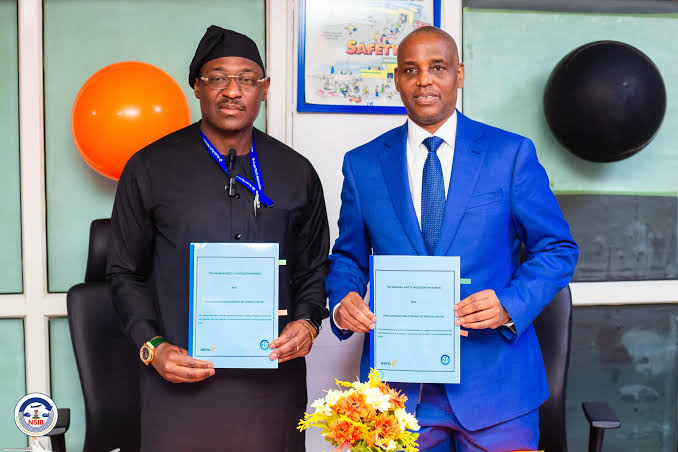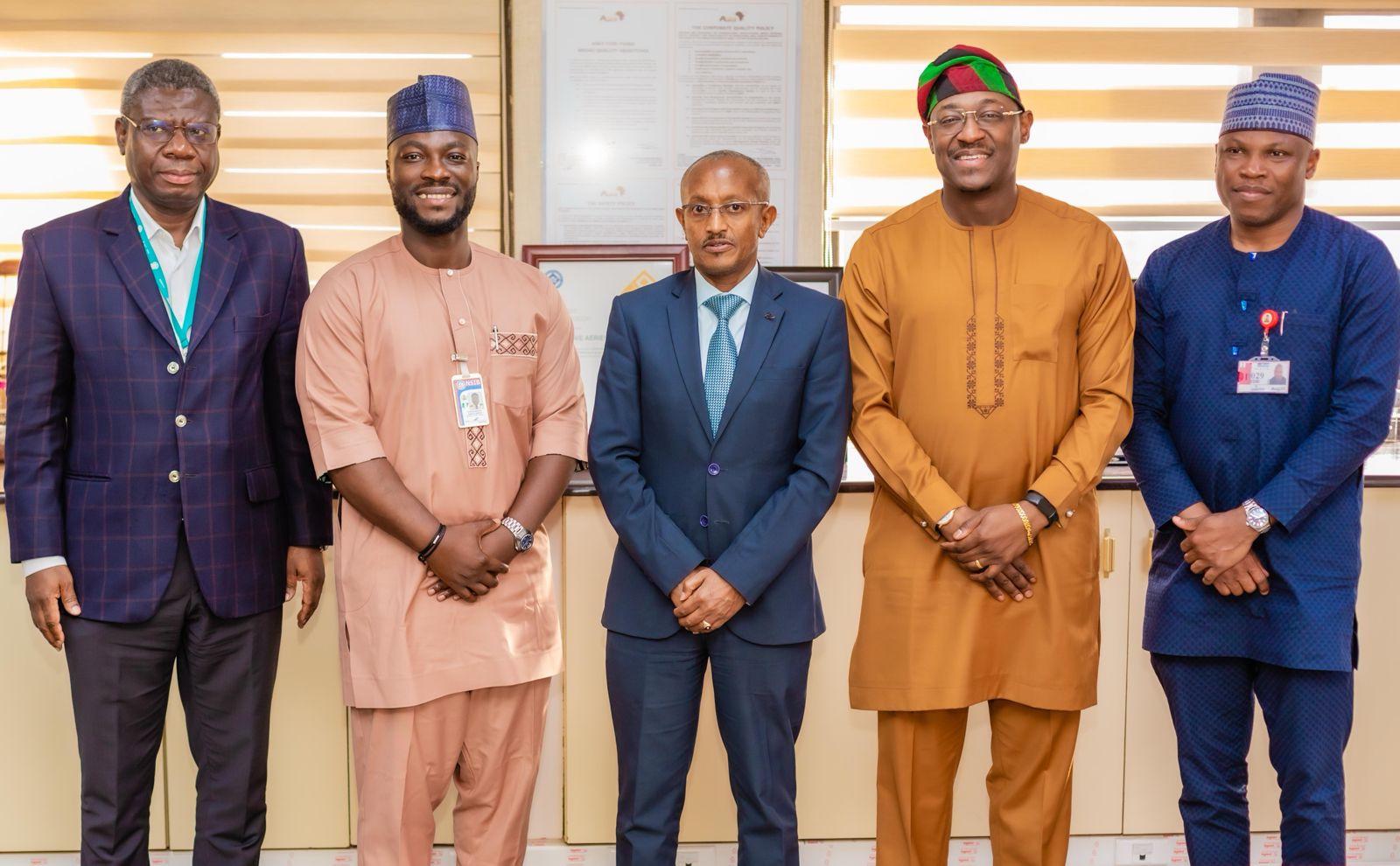
The Nigerian Safety Investigation Bureau (NSIB) has unveiled three draft regulations aimed at establishing an integrated safety framework for Nigeria’s rail, maritime and aviation sectors.
The move, it hinted, is aimed at harmonising safety standards and enhancing collaborative investigation protocols across all modes of transportation.
The proposed regulations were presented during the Multimodal Transportation Stakeholders’ Workshop in Abuja on Friday.
The event, themed ‘Strengthening Transport Safety Standards Through Collaboration,’ attracted industry leaders, policymakers, safety experts, and government officials from the aviation, marine, rail and road sectors to chart the way forward for Nigeria’s transportation safety framework.
The Director General, NSIB, Capt. Alex Badeh Jr., in his opening remarks, introduced the three regulatory documents.
The first of the drafts, he noted, is the Railway (Investigation of Accidents and Incidents) Regulations, which propose a structured methodology for probing rail accidents and near-misses.
This, he said, outlines robust procedures for evidence-based investigations, ensuring that every incident is thoroughly analysed with the aim of producing actionable safety recommendations.
According to Badeh Jnr., “This framework will ensure that rail accidents are treated with the urgency and depth they deserve, with the ultimate goal of preventing reoccurrence.”
The second draft, he opined, is the Maritime Safety Investigation Regulations, which seek to enhance transparency, accountability and modernisation in the handling of maritime incidents.
He explained that the maritime regulations are designed to bring greater transparency, accountability and modernised procedures to the investigation of accidents in Nigeria’s inland and coastal waterways and port operations.
His words: “Beyond improving outcomes, this regulation is expected to foster trust and compliance in our maritime ecosystem.
“The third regulation, a revised version of the Civil Aviation (Investigation of Air Accidents and Incidents) Regulation, integrates emerging technologies, global lessons and stakeholder feedback.
“It aligns Nigeria’s aviation investigation procedures with international standards while enhancing readiness and responsiveness in air transport.
“By modernising this framework, we are better prepared to respond to aviation incidents and strengthen public confidence in the sector.”
Badeh explained that the drafts were the result of months of dedicated work, informed by accident data and global standards.
“Our primary objective is to foster open dialogue, exchange insights and collectively refine the frameworks that safeguard lives and infrastructure in aviation, maritime and railway sectors,” he said.
Inviting stakeholders to provide valuable input to ensure the regulations are both effective and practical, the NSIB boss described the drafts as foundational instruments for creating a unified, intermodal transport safety framework in Nigeria.
He explained that the drafts were developed after months of rigorous work, informed by accident data, international best practices, and extensive stakeholder consultations.
“These three regulatory drafts form the cornerstone of our mission to build a safer, integrated national transport network.
“They are not arbitrary rules, but a culmination of data-driven analysis, global benchmarking, and real-world feedback. We are excited to present them and seek your valuable input to refine them further,” said Badeh.
He emphasised that the success of these regulations’ hinges on collective ownership, and invited stakeholders to critically review and contribute to the drafts, with the assurance that all constructive input would be incorporated before the final adoption.
“This is not a regulatory imposition but a collaborative evolution. These drafts must be practical, enforceable and capable of truly preventing future incidents,” he said.
He further urged transportation agencies and stakeholders to break down institutional silos, share data, collaborate on training, and embrace innovation, especially AI-powered predictive tools, to build resilient and future-ready safety systems.
Also speaking at the workshop, the Minister of Aviation and Aerospace Development, Mr. Festus Keyamo (SAN), commended NSIB’s independence and investigative mandate, as outlined in the NSIB Act of 2022, and called for the full implementation of its safety recommendations.
He noted the bureau’s seven-day mandate to initiate investigations and 12-month deadline to publish final reports as commendable.
“The NSIB’s proactive, preventive and blame-free approach is aligned with global best practices. We must implement their safety advisories without delay. Ignored lessons lead to repeated tragedies,” Keyamo said.
Also contributing to the discourse were prominent figures such as a former Managing Director of the U.S. National Transportation Safety Board, Mr. Dennis Jones; former MD of Nigerian Railway Corporation, and a former Chief of Naval Staff, Vice-Admiral Dele Ezeoba (rtd), who all emphasised the urgent need for deliberate on collaboration across government agencies, private operators and regulatory bodies to address systemic gaps, share safety intelligence and build a unified framework for reducing transport-related incidents in Nigeria.
The Managing Director of the National Inland Waterways Authority (NIWA), Bola Oyebamiji, also addressed the forum, highlighting the economic and cultural relevance of Nigeria’s waterways.
He disclosed that NIWA recorded 6.82 million passengers and 3.6 million metric tonnes of cargo across inland waterways in the first half of 2025 alone.
Oyebamiji noted NIWA’s recent strides in water safety, including the gazetting of the Water Transportation Code, deployment of over 600 water marshals, and new boats to bolster inland security.
He called on more states to support the phasing out of unsafe wooden boats and to adopt modern, high-capacity ferries.
“Our waterways are not just corridors for commerce, but lifelines for many communities. Safety on water is integral to our national development,” he stated.
The NSIB Multimodal transportation stakeholders’ workshop marks a significant milestone in Nigeria’s quest to build a world-class, multimodal transport safety system.
As technical consultation and engagement with stakeholders continue, the three draft regulations will undergo expert reviews with inputs from across sectors, after which they will be finalised for formal adoption.






